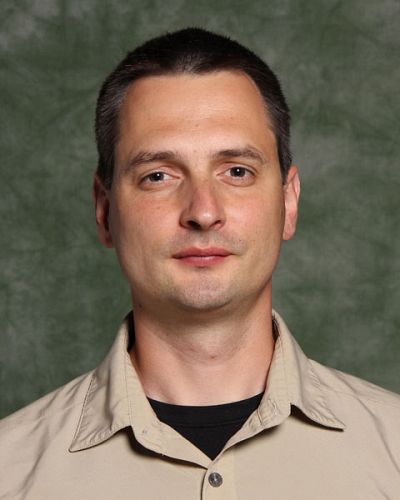
Alex Nikulin
Associate Professor; Undergraduate Director
Background
Professor Alex Nikulin earned his PhD from Rutgers University in 2011 and joined the Binghamton University faculty as an assistant professor in 2015. His research focuses on the broad field of Energy Geophysics, with applications in classic seismology, exploration geophysics, as well as the emerging field of automated geophysical surveying. Professor Nikulin is a co-founder of the Geophysics and Remote Sensing Research Laboratory at Binghamton University, a collaborative academic platform that brings together undergraduate and graduate researchers, faculty from multiple departments of Binghamton University, as well as multiple industry, academic, government, and NGO partners, to work on resolving critical issues facing society through innovative applications of geophysical techniques. His research areas of focus are outlined below:
Research Streams
1. Remote detection, identification and assessment of abandoned oil and gas wells in New York state
This project, being pursued in close collaboration with the New York Department of Conservation, focuses on developing a remote sensing methodology to detect and identify abandoned oil and gas wells across the state. This effort is largely enabled by combining recently-developed compact magnetometers and long-range unmanned aerial vehicles (UAVs), which allow our research group to develop wide-area search algorithms to detect and identify magnetic signatures associated with otherwise invisible abandoned well pads. This project currently serves as a course-based research module in the Freshman Research Immersion at Binghamton University, where Professor Nikulin is a faculty mentor.
2. UAV-based automated geophysical surveys; a new frontier in landmine detection.
It is estimated that there are more than 100 military munitions and explosives of concern (MEC) devices in the world of various size, shape, and composition. Millions of these are surface plastic landmines with low- pressure detonation regimes. As part of a collaboration with the Binghamton Freshman Research Immersion program, our research group developed a method to remotely assess thermal signatures of plastic landmines relative to background geology – this methodology permits rapid detection of randomly dispersed plastic MECs with a high degree of accuracy and low associated costs. This project currently serves as a course-based research module in the Freshman Research Immersion at Binghamton University, where Professor Nikulin is a faculty mentor.
3. Passive-source seismic investigation of the Central Chile subduction zone
The flattening of the subducting Nazca plate correlates to an apparent gap in the volcanic front of Central Chile. Our research group pursues a multi-disciplinary study focused on understanding geodynamic processes influencing subduction zone geometry in Central Chile and their impact on regional seismic and volcanic activity. We report presence of a highly anisotropic layer above the subducting slab, possibly indicating an area of extensive hydration triggered by fluid release from the subducting plate. This may be indicative of higher than anticipated degree of hydration for this area of the subduction zone. Our results may help explain the nature of the Central Chilean seismic gap and the correlating gap in the volcanic front.
4. Induced seismicity in Northeastern Pennsylvania; establishing a correlation to regional hydrocarbon development.
This work focuses on analyzing data from existing seismic network stations across Northeastern Pennsylvania to correlate these events to specific episodes of hydraulic fracturing. Preliminary results of this research effort show that in the absence of wastewater disposal in Pennsylvania, it is possible to confidently make the connection between a specific episode of hydraulic fracturing an induced seismic event.
Research Interests
- Natural and Induced Seismicity
- Subduction Zone Processes
- Natural Resources Exploration and Development
Teaching Interests
- Geophysics
More Info
Recent Publications:
Applying Deep Learning to Automate UAV-Based Detection of Scatterable Landmines, J Baur, G Steinberg, A Nikulin, K Chiu, TS de Smet, Remote Sensing 12 (5), 859, https://doi.org/10.3390/rs12050859
Tracing Geophysical Indicators of Fluid‐Induced Serpentinization in the Pampean Flat Slab of Central Chile, A Nikulin, J Bourke, J Domino, J Park, Geochemistry, Geophysics, Geosystems 20 (9), 4408-4425, https://doi.org/10.1029/2019GC008491
A UAV-based magnetic survey method to detect and identify orphaned oil and gas wells, A Nikulin, TS de Smet, The Leading Edge 38 (6), 447-452, https://doi.org/10.1190/tle38060447.1
Drones and" Butterflies": A Low-Cost UAV System for Rapid Detection and Identification of Unconventional Minefields, T deSmet, A Nikulin, W Frazer, J Baur, J Abramowitz, D Finan, S Denara, ... Journal of Conventional Weapons Destruction 22 (3), 10, https://commons.lib.jmu.edu/cisr-journal/vol22/iss3/10
Detection and Identification of Remnant PFM-1 ‘Butterfly Mines’ with a UAV-Based Thermal-Imaging Protocol, A Nikulin, TS De Smet, J Baur, WD Frazer, JC Abramowitz, Remote Sensing 10 (11), 1672, https://doi.org/10.3390/rs10111672
Media Coverage
Popular Mechanics:
The Drones That Track Down Buried Warheads This new tech can quickly detect unexploded ordnances after an armed conflict.
https://www.popularmechanics.com/flight/drones/a30418522/drones-buried-warheads/
Binghamton University News
Geology Student Wins Goldwater Scholarship: Jasper Baur's research focuses on plastic-landmine detection
https://www.binghamton.edu/news/story/1857/geology-student-wins-goldwater-scholarship
PBS News Hour:
These drone projects are saving lives and protecting nature
https://www.pbs.org/newshour/world/these-drone-projects-are-saving-lives-and-protecting-nature
Scientific American
Drones Used to Find Toylike "Butterfly" Land Mines
https://www.scientificamerican.com/article/drones-used-to-find-toylike-butterfly-land-mines/
Der Spiegel
Mit Drohnen nehmen Forscher den Kampf gegen Landminen auf